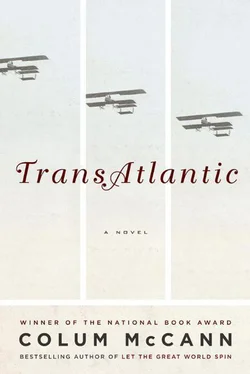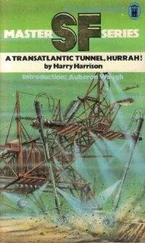A thaw would come soon. She would have to learn how to move the ice herself. To get it to the boats and to float it downriver.
She lay in her bed, surrounded by her four remaining children. The boys were old enough now, she thought. Emily could help manage the books. There were ways to survive. She looked out at the lake. The light from the moon sighed upon it. She woke Tomas first, then the other two. They stepped out into the night, down towards the barn, their breath making cloudshapes against the dark. First of all we’ll get the wagons ready, she said. Make sure the horses are fed.
THE BOOKLETS CAME from a company in Cincinnati. The McGuffey Reader. An All-Surpassing Opportunity. Teach Yourself in 29 Days. Money Back Guarantee . She had no idea what to do with them. The words presented themselves as a series of squiggles. How could she learn to read if she could not, in the first place, read? How could she be expected to learn what was unlearned in the first place? Her eyes swam. Her throat tightened. She tucked the booklets away on the shelf.
She hired a carriage and went south, two days, all the way to St. Louis. The buildings seemed so enormously tall. Laundry fluttered from windows. Men in stetsons tied their horses to hitching posts. A railway station whistle sounded out. Lily inquired about the bookshop. A young boy pointed the way. A bell on the door rang. She shuffled among the shelves. Frightened that she might be seen. The words on the spines of the books meant nothing at all.
It was a clerk who found it for her, high on the shelves accessible only by ladder. She knew it was he by the frontispiece engraving. The book was wrapped for her in brown paper and twine.
At home, Emily ran a small finger underneath the marks on the page. This is I . This is W . This is A . This is S . This is a B .
BY THE THIRD year after Jon Ehrlich’s death, Lily had a group of men working with her — two Norwegians, two Irishmen, and a Breton foreman. Her sons, too. Lily was a small thin figure on the ice, a little hunched by age, tapered by sorrow, but her voice carried across the expanse. They bought the newest machinery: broadaxes, crosscut knives, ice plows, harnesses. The saws kicked up white sparks. The horses heaved and steamed. The sheds were rebuilt and reinforced.
After school, Emily helped skim the huge cakes of ice across the surface of the lake.
Lily went to the city once a month. A grueling journey. Often it took three days each way. Lily haggled across the desk on Carondelet Avenue. She knew the price she was getting and she knew at what price the ice dealer was selling. It galled her to think that there was such a gulf.
She took Jon Ehrlich’s fountain pen out of her small silver purse and marked a signature on the page. She had learned this much, a push of the pen into the resemblance, at least, of a name. The ice dealer worked a thumb at the base of his nose. He was thin and sharp, as if he’d been sliced with a fresh saw.
— You can write?
— Of course I can write. What do you think I am?
— I didn’t mean anything by it, Mrs. Ehrlich.
— Well, I hope not.
She strode away, along the Mississippi. She watched the younger women walk along in their elegant finery: wide hats and swishing dresses. Paddleboats and steamers. The whole river was wide with commerce. Paperboys called out about gold and railroads. A hot-air balloon went over the river and drifted off towards the west. A man on a machine rode back and forth near the Opera House. With an enormous front wheel. The onlookers called it an ordinary . There were young men in wide cowboy hats who tied their horses outside saloons. They didn’t glance at her much anymore, but Lily didn’t mind. Her back was stiff from the years of ice. She developed a rolling shuffle. She kept three elegant dresses for business matters. The rest of the time her clothing was plain, dark, a touch of mourning about it.
In her fourth year without her husband, she negotiated a price with the foreman from Brittany. She sold him the cabin, the leases, and all the equipment. The first thing she packed was the painting that Jon Ehrlich had given her. All the boxes, the furniture, the chairs, the delph, the books. They loaded four wagons. She kept the painting upfront. They pulled up to their new home on Florissant Avenue. The roadbed was made with crushed limestone. The house was a two-story redbrick with high ceilings and a wide staircase. A pale blue carpet festooned with threaded roses. At the top of the stairs she hung the painting, then immediately set about her business as a dealer. Middle Lake Ice . An English sign writer made a logo on the warehouse doors. She was flustered by his accent. He bowed to her and she blazed red with embarrassment. An Englishman, of all things. Bowing to her. Lily Duggan. Bridie Fitzpatrick. Once the death carts had rumbled. The snowflakes fell.
It amazed her to think that she didn’t even have to touch the ice anymore. That it was others, farther north, in Missouri, Illinois, Iowa, who did the work of farming. She costed out the business carefully. The wages, the transport, the melt. The astounding logic of money. The ease with which it could appear, and the speed at which it could be lost. In St. Louis, she secured a line of credit with the Wells Fargo Bank on Fillmore. She walked up to bank tellers who knew her name. How are you, Mrs. Ehrlich? Such a pleasure to see you again. On the street men and women nodded to her politely. It frightened her. She held the edge of her wide dresses and stammered hello. She was shown the best sides of meat in the victualers. There was a hat shop on Market Street. Lily bought a flamboyant design with an ostrich feather, but when she brought it home she caught sight of herself in the long oval mirror and couldn’t bear the thought of being seen in it, put it back in its box and never touched it again.
The demands came. From the hospitals. On the steamers. In the restaurants. Fish stalls. Confectioner stores. There were even some hotels that had begun to use the ice in drinks.
After six years Lily Ehrlich was able to send her oldest surviving boy, Lawrence, to university in Chicago. Then Nathaniel and Tomas, too. In the winter of 1886 Emily turned fourteen years old. She spent most of her time upstairs in her bedroom, devoted to books. Lily thought her daughter, at first, to have been overcome with loneliness, but soon found out that the girl liked nothing more than to shut the curtains, light a candle, read in the flickering dark. The plays of Shakespeare. The writings of Emerson. The poetry of Harte, Sargent, Wordsworth. The room was so full of books that Lily couldn’t see the wallpaper.
Her own experiment with books had not lasted very long: she was mother to the daughter. That, in itself, was enough.
Lily divided her ice business in the winter of 1887. Three equal parts to her sons. Lawrence came home from university wearing a gray suit and bow tie, the owner of an eastern-sounding accent. The two younger boys were interested in the puffs of steam that drifted across the rail yards: they sold their portions, tipped their hats, said good-bye. Nathaniel went west to San Francisco, Tomas went east to Toronto. Emily received nothing: not out of spite, but simple convention. It never even crossed Lily’s mind. Mother and daughter bought a smaller house on Gravois Road. Out front, they cultivated a garden. They kept to themselves. On Sundays they dressed for church: long gloves, wide hats, white veils that fell over their eyes. They were sometimes seen on the promenade together. There weren’t many suitors for Emily’s attention. Nor did Emily expect any. She was hardly considered pretty. The books consumed her. There were nights when Lily asked Emily to come to her bed, slip in the covers beside her, settle against the pillows, and read. I was born in Tuckahoe, near Hillsborough, and about twelve miles from Easton, in Talbot county, Maryland .
Читать дальше












